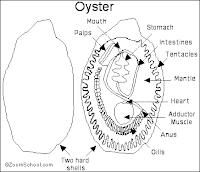1) vertebrates: animals with backbone
2) invertebrate: animals without backbone
3) symmetry: the balanced arrangement of body parts around a center point or along a center line.
4) sponge: simple invertebrates with pores.
5) pores: small opening.
6) stinging-cell animal: animals with stinging cells and hollow, sacklike bodies that lack arms.
7) tentacles: armlike parts that surround the mouth.
8) flatworm: the simplest worms.
9) tapeworm: kind of flatworm that has a flattened, ribbonlike body divided into parts.
10) cyst: young worm with a protective coat.
11) planarian: common freshwater flatworm that is not a parasite.
12) roundworm: worm with long body and pointed end.
13) hookworm: roundworm that is parasite for humans.
14) anus: opening in wich undigested food leaves the body.
15) segmented worms: worms divided into sections (segments)
16) soft-bodied animal: animals with a soft body usually protected by a hard shell.
17) mantle: thin fleshy tissue.
Illustrations:
1- vertebrates
4- sponge
5- pore
6- stinging- cell animal
8- flatworm
9- tapeworm
10- cyst
11- planarian
12- roundworm
13- hookworm
14- anus
15- segmented worm
16- soft-bodied animal
17- mantle
















No hay comentarios:
Publicar un comentario
What method do you thing is better the traditional method ot the new technology? Why?